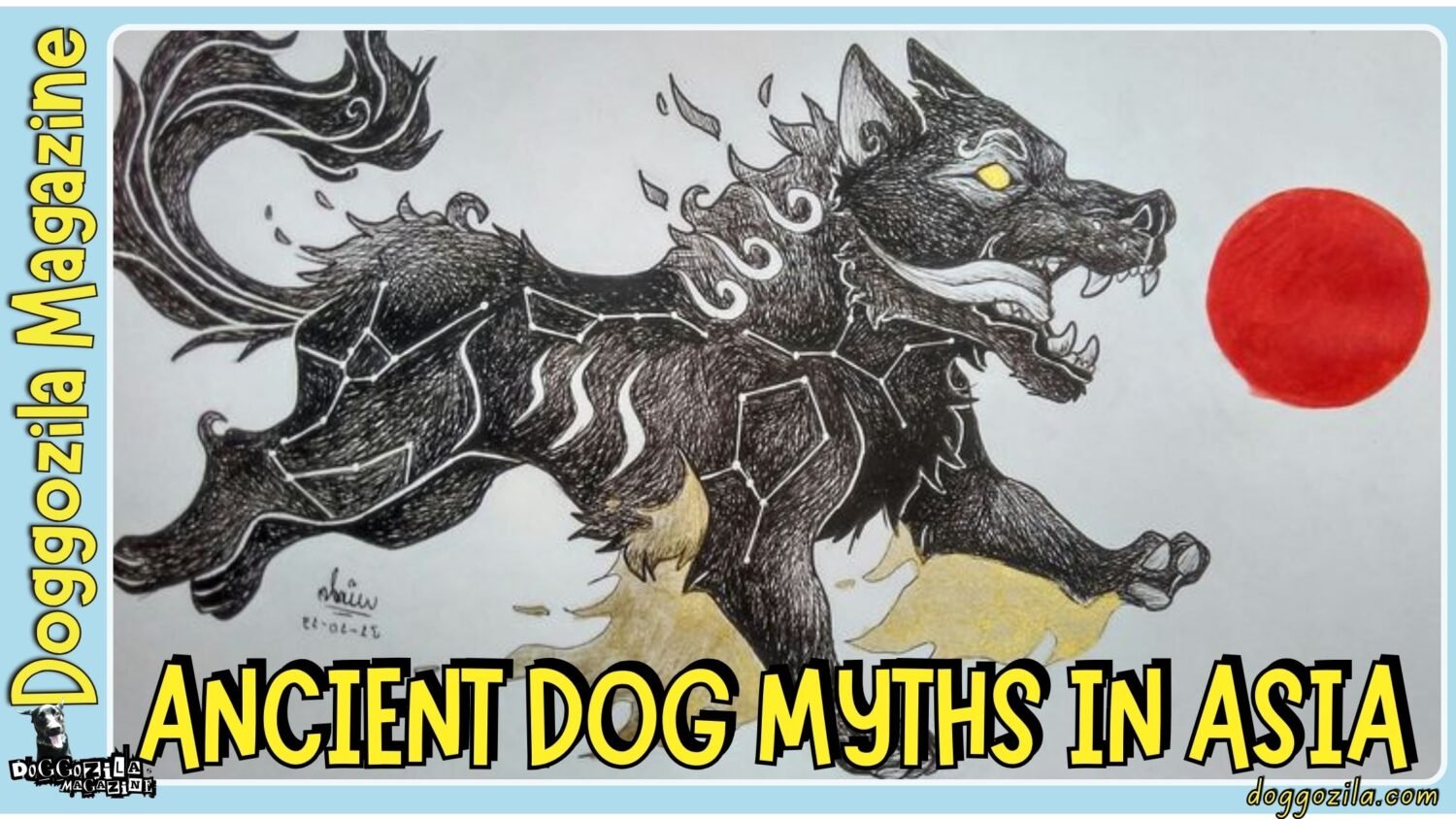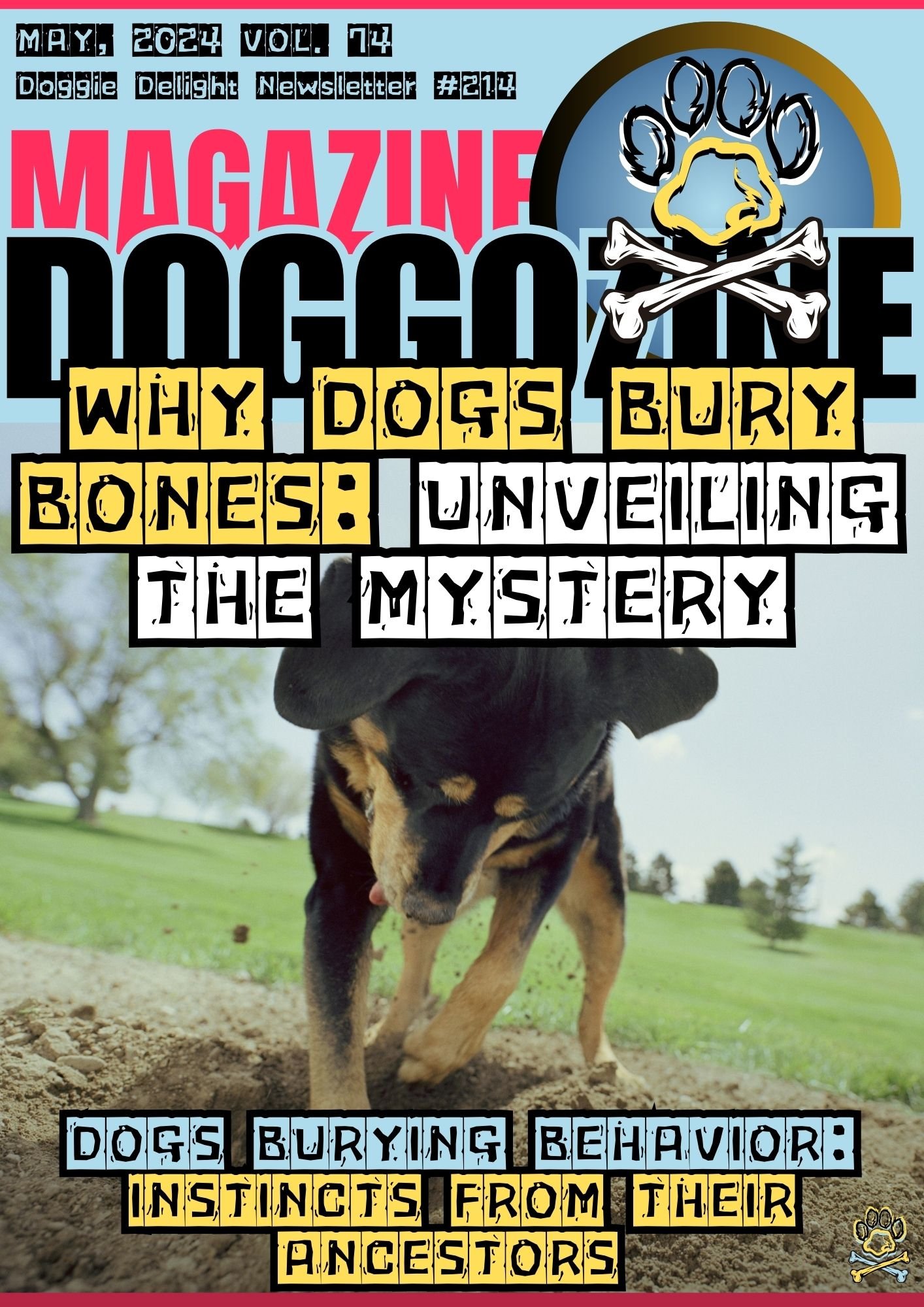
DECODING WHY DOGS BURY BONES AND OTHER OBJECTS WITH EXPERT INSIGHTS AND PRACTICAL SOLUTIONS
Do you often find holes in your backyard? Does your furry friend have a habit of hiding toys or treats? Many pet owners wonder why dogs bury bones and other objects. The truth is, this behavior has fascinating roots. In this guide, we’ll explore the reasons behind this instinct. We’ll also share expert tips to manage it effectively.
Why Ancestors History is Important to know When We Explore Why Do Dogs Bury Bones?
Dogs’ burying habits are connected to their wild ancestors. We’ll dive deep into this history and how it shapes modern pups. Additionally, we’ll discuss the roles of boredom and anxiety. Whether your canine companion is a playful pup or a skilled hunter, you’ll learn ways to provide mental stimulation. By understanding this behavior, you can strengthen the bond with your beloved pet.
Join us as we unravel the mystery behind why dogs bury bones. You’ll gain valuable insights and practical strategies. This will help create a harmonious environment for your furry friend. Get ready to decipher this age-old behavior and nurture a deeper connection with your canine companion.
Understanding Why Do Dogs Bury Bones: Instincts from Their Ancestors
Have you ever caught your dog burying a toy or bone? This puzzling act has roots in their wild ancestry. Dogs, like wolves and foxes, have an innate drive to bury valuable items. In the wild, this ensured a steady food source. It also protected resources from threats.
Despite being domesticated, dogs retain this instinctual burying behavior. It’s a remnant of their evolutionary past. When your pup buries a bone or toy, they’re simply following their natural urges. This behavior is an inherited trait, passed down from their wild predecessors.
Dogs have behaviors that come from their wild ancestors, even though they are now pets. One of these behaviors is burying bones, toys, and other things. This is an extension of their ancestors’ habits, even if your dog has never had to find food for itself in the wild.
🔑 Key Points: Dogs bury things because of instincts passed down from their wild ancestors. These instincts helped their ancestors survive.
The Link Between Wild and Domestic Dogs
Just like a wild fox might bury its next meal or a wolf might hide meat for later, your pet dog is following the same instincts when it buries its favorite things. This behavior comes from their ancestors who needed to survive in the wild.
Protecting Valuable Resources
In the wild, animals bury food and other important things to protect them from threats like other predators or even members of their own pack. Your dog’s burying behavior comes from this survival strategy that their ancestors used.
Highlighting Breeds with a Predilection for Burying
All dogs have the instinct to bury things, but some breeds are more likely to do it because of their history. Terriers, Dachshunds, and Beagles were bred to hunt and chase prey underground. So, these breeds often have a stronger desire to dig and bury compared to other dogs. However, any dog can show burying tendencies, not just these breeds.
🔑 Key Points: While all dogs can bury things, Terriers, Dachshunds, and Beagles are more likely to do it because they were bred to hunt underground. But breed is just one factor, and any dog might show this behavior. Some dog breeds are more likely to bury things. For example, Terriers and Dachshunds have a history of hunting. This behavior is part of their instinct. However, all dogs can show burying behavior.
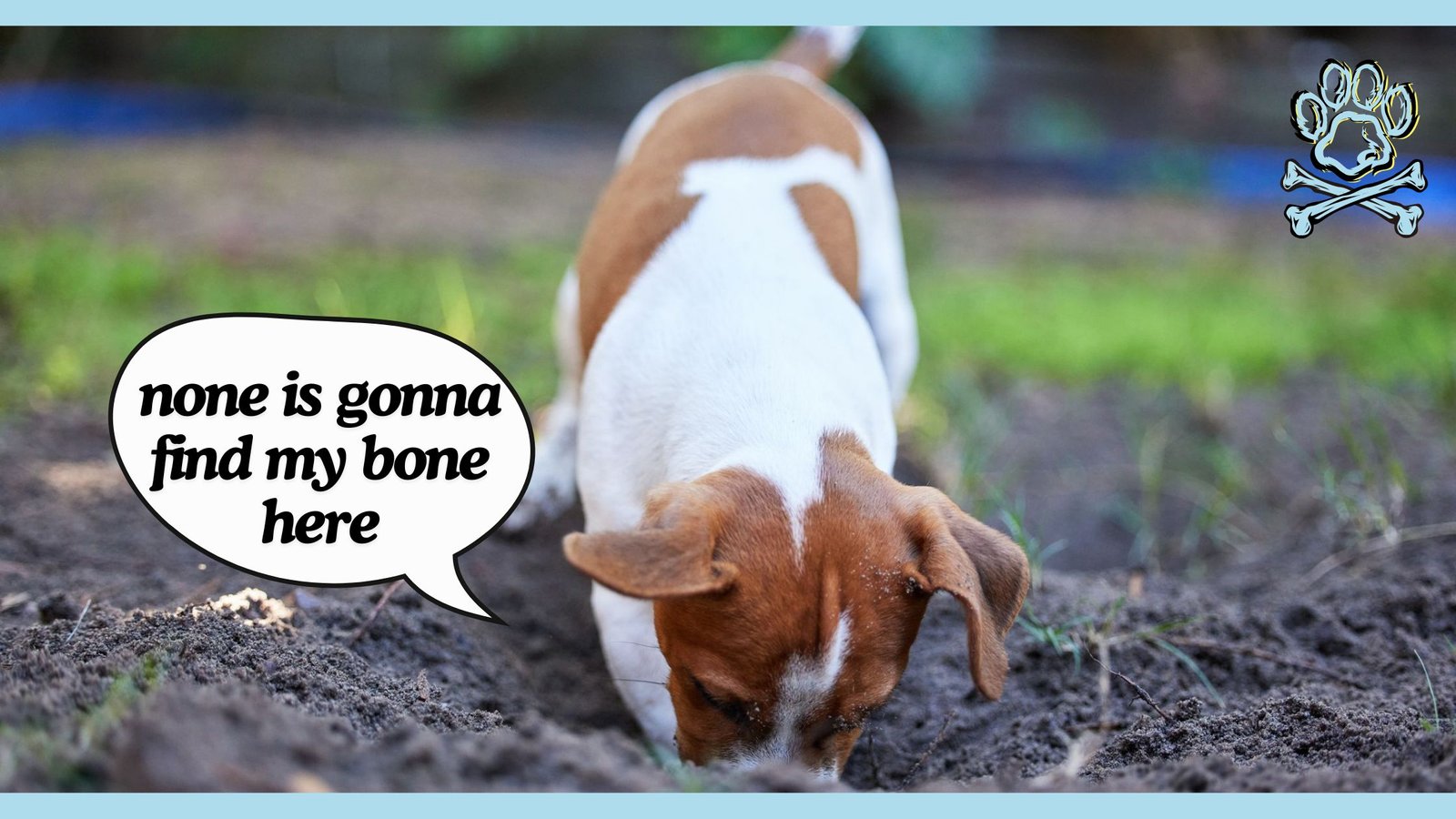
WHY BOREDOM CAN CAUSE DOGS TO BURY BONES?
If dogs feel bored or don’t have enough mental stimulation, they may bury things as a way to entertain themselves. When pet owners don’t provide engaging activities, dogs turn to burying to pass time. To stop dogs from burying due to boredom, it’s important to give them interactive toys and puzzles.
These keep their minds occupied when not busy. Rotate toys often to keep things new and interesting. Consider puzzle feeders that make dogs solve problems, or treat-dispensing toys that reward play. Providing mental stimulation helps redirect energy away from burying into more constructive activities.
🔑 Key Points: Boredom can increase burying behavior. But interactive toys and puzzles give mental stimulation, positively redirecting your dog’s energy.
Enrich Your Dog’s Environment
Besides toys, enriching your dog’s environment with different textures, smells, and sounds can also help reduce boredom and excessive burying. Varying sensory experiences keeps dogs engaged.
Schedule Regular Playtime
Making time for regular playtime strengthens your bond with your dog. It also provides mental and physical stimulation needed to keep them content and less likely to bury from boredom.
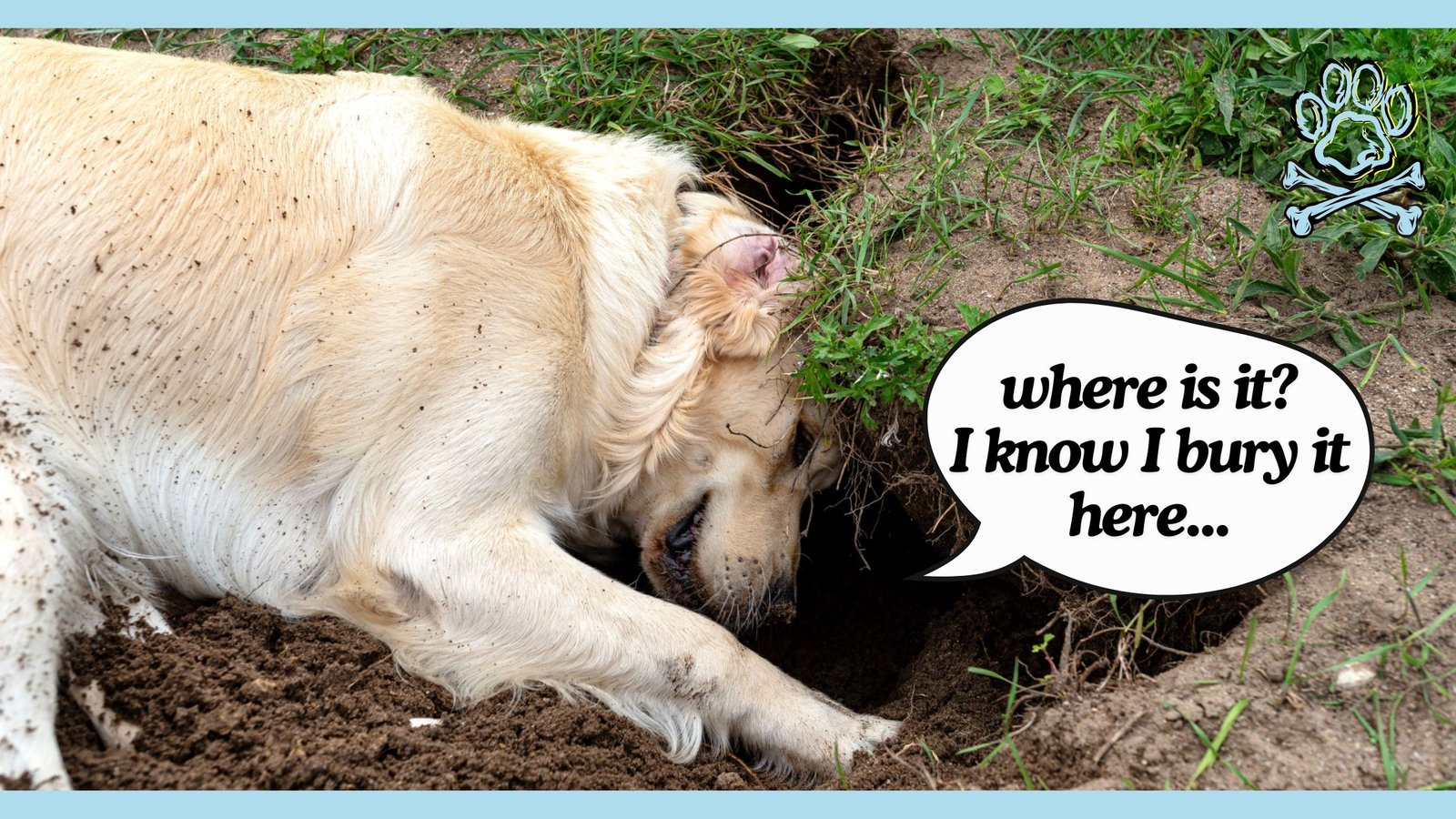
ANXIETY AND STRESS: PSYCHOLOGICAL TRIGGERS FOR BURYING
Just as people, dogs as well can feel anxious or stressed due to various reasons. When they experience these emotions, they may bury items as a way to cope or self soothe. This behavior is common in multi-dog households. Resource guarding and competition for resources can increase stress levels.
Dogs may bury things they value to protect them from other pets. If your dog’s burying seems linked to anxiety, it’s crucial to address the emotional issues. Work with a certified dog trainer or therapy dog team. They can help develop strategies to reduce stress and promote relaxation.
🔑 Key Points: Anxiety and stress can trigger burying in dogs. Addressing underlying emotional issues through training and therapy can minimize this coping mechanism.
Identifying Stressors in Your Dog’s Environment
Notice potential stressors in your dog’s surroundings. Changes in routine, new people or pets, loud noises, or construction can cause stress. Try to minimize these stressors or provide a safe space for your dog to retreat when overwhelmed.
The Benefits of Therapy Dog Training
If your dog’s anxiety is severe, consider therapy canine training. These programs help dogs develop coping skills and emotional resilience. They also strengthen the human-animal bond and provide tools for owners to support their dog’s mental well-being.
Evolution of Burying Behavior: From Wild Animals to Domestic Dogs
To understand your dog’s burying behavior, it helps to look at this instinct’s evolution from wild animal ancestors. In nature, canids like wolves, foxes, and coyotes hide food to protect it from predators and save it for later meals. This behavior isn’t unique to canids. Many wild animals – big cats, bears, and more – cache food for future consumption. As wild dogs evolved into pets, this instinct remained, even if the need for food protection lessened.
🔑 Key Points: Dogs bury things due to an innate instinct from wild ancestors who cached food to protect it from predators and save it for later.
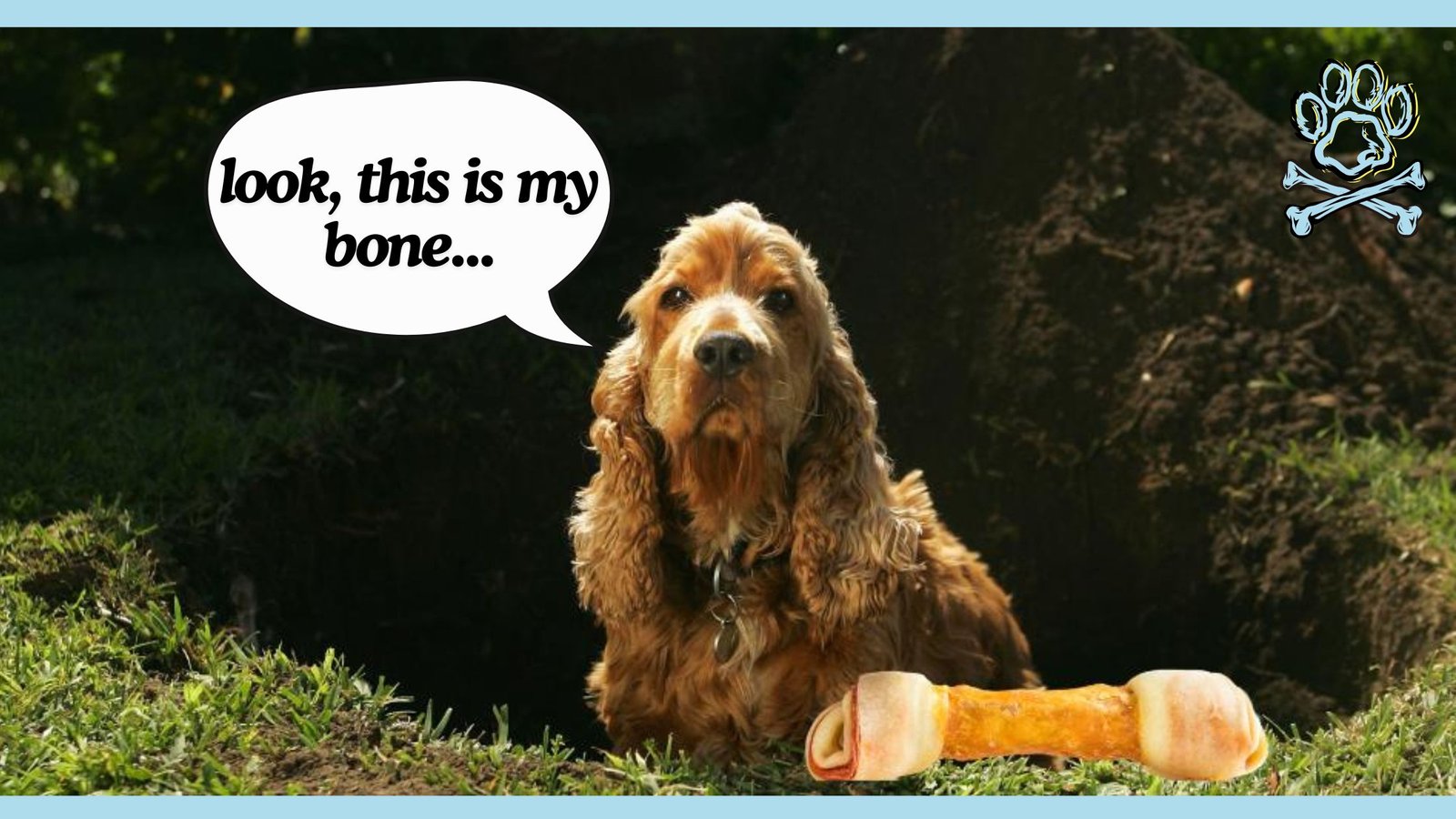
EFFECTIVE SOLUTIONS TO MINIMIZE AND REDIRECT BURYING BEHAVIOR
If your dog’s burying becomes excessive or destructive, there are solutions to minimize and redirect this instinct. The key is working with your dog’s natural tendencies, not against them. One strategy is creating a designated digging area in your yard with loose soil or sand. Hide toys and treats here yourself, and praise your pup when they uncover them. This encourages burying in an approved space.
You can also redirect burying behavior to puzzle toys or treat-dispensing balls. These engaging toys challenge your dog mentally and physically, providing a positive outlet for their innate burying urges. Dogs love hiding things they see as valuable. This behavior is natural for them. It helps if you give your dog safe ways to bury items.
Positive Reinforcement Training
Use positive reinforcement when training your dog. Reward good behavior with treats and praise. For example, reward burying in allowed areas or using puzzle toys.
Consulting with a Certified Professional Dog Trainer
If your dog’s burying gets hard to manage, talk to a certified dog trainer. They can give custom tips for your dog. They’ll help make a training plan.
The Significance of Safe Places: Understanding Where and Why Do Dogs Choose to Bury Bones and Other Objects
Dogs choose specific spots to bury favorite toys or treats. These spots feel safe and comfortable. Your dog may pick places that smell familiar, like your family. Dogs have an excellent sense of smell. They use scents to find cozy burial spots. By burying items in familiar-smelling areas, dogs create a sense of security. To sum up, let your dog safely bury items in allowed areas. This natural behavior helps dogs feel calm and secure.
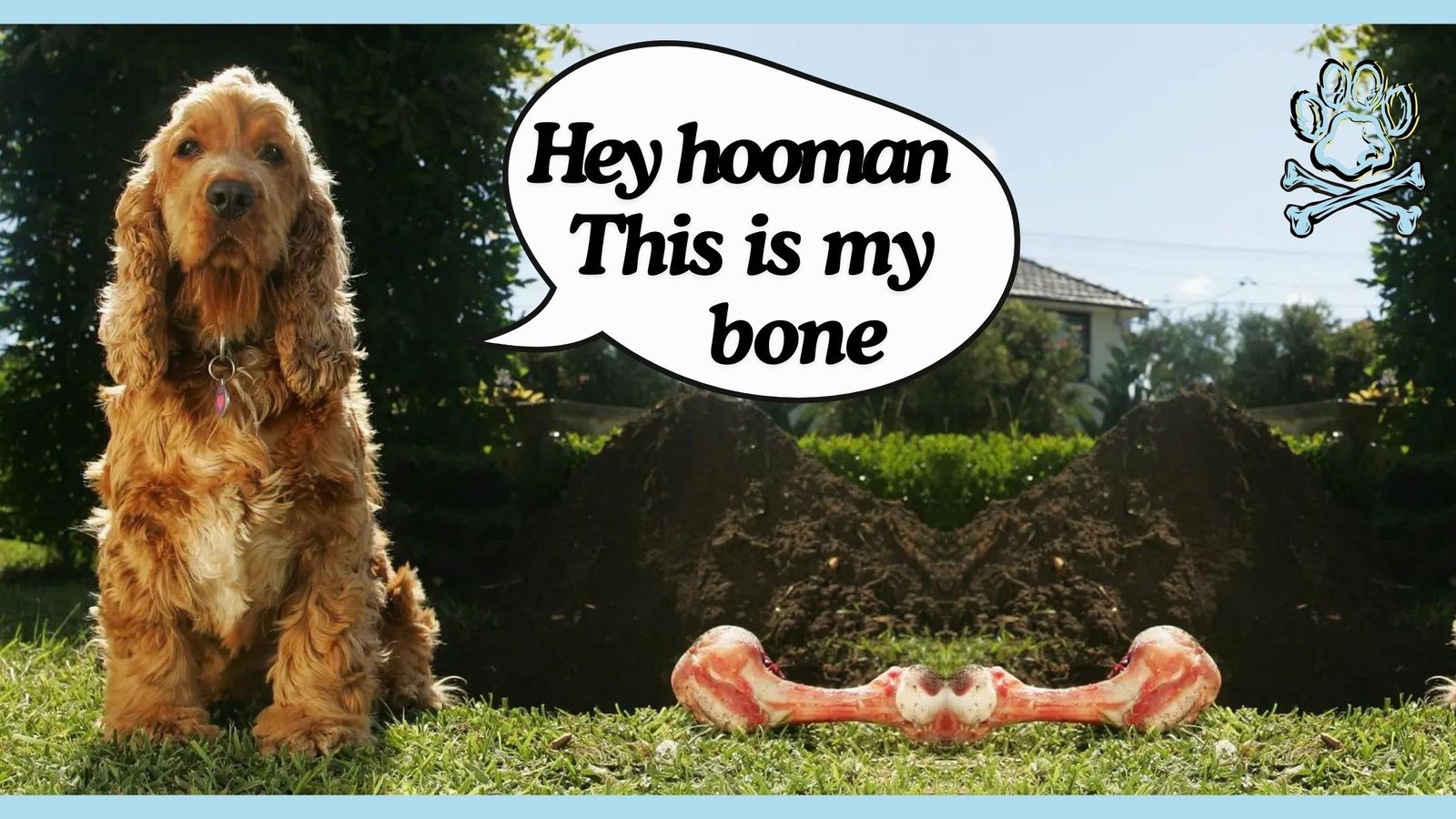
THE IMPACT OF A DOG OWNER’S INTERACTION AND ENGAGEMENT
A dog’s behavior is greatly affected by its owner’s level of interaction and engagement. Dogs are social animals that need human companionship. If they feel neglected or bored, they may start burying things to cope with loneliness and lack of stimulation. However, dogs that get enough playtime, exercise, and mental stimulation are less likely to bury excessively.
The amount of quality time a dog owner spends with their furry friend impacts their burying habits. Engaging with dogs reduces problem behaviors. Spending time together strengthens the human-animal bond. It keeps dogs happy, healthy, and well-behaved.
🔑 Key Points: How much interaction and engagement a dog gets from its owner affects its burying frequency and intensity. Dedicating quality time to your furry companion is crucial for its well-being.
Canine Caching: A Historical and Behavioral Perspective
Dogs burying food and objects has deep historical roots in wild canid behavior. In times of scarcity, burying extra food ensured a reliable food source for future meals. This caching behavior was vital for animals that relied on fresh meat. Burying allowed them to preserve their kill for later consumption and protect resources from other pack members or predators.
Although modern dogs don’t face the same challenges as their ancestors, the instinct to cache remains. Understanding this historical context can help pet owners better interpret and respond to their dog’s burying behavior. It’s an ingrained habit with evolutionary origins.
While burying today may seem unnecessary, it’s a natural canine behavior. Dogs bury to save food for later or to hide valuable items. Recognizing this instinct and providing appropriate outlets can prevent excessive burying.
🔑 Key Points: Burying bones has a long history in wild dogs. It helped them survive. Learning about this can help pet owners understand why their dogs bury things.
Dispelling Myths: Common Misconceptions About Why Do Dogs Bury Bones
Many people have wrong ideas about why dogs bury bones and other objects. One myth is that dogs hide things from their owners or other pets. But really, dogs bury items out of instinct, not to hide them.
Another myth is that only some dogs bury bones. In fact, all dogs can show this behavior. It’s important to separate facts from fiction when trying to understand your dog’s actions. Dispelling these common myths helps owners appreciate their furry friends’ complex nature.
🔑 Key Points: Separating facts from fiction is key to understanding your dog’s burying behavior. Many common myths can lead to misunderstanding this natural instinct.
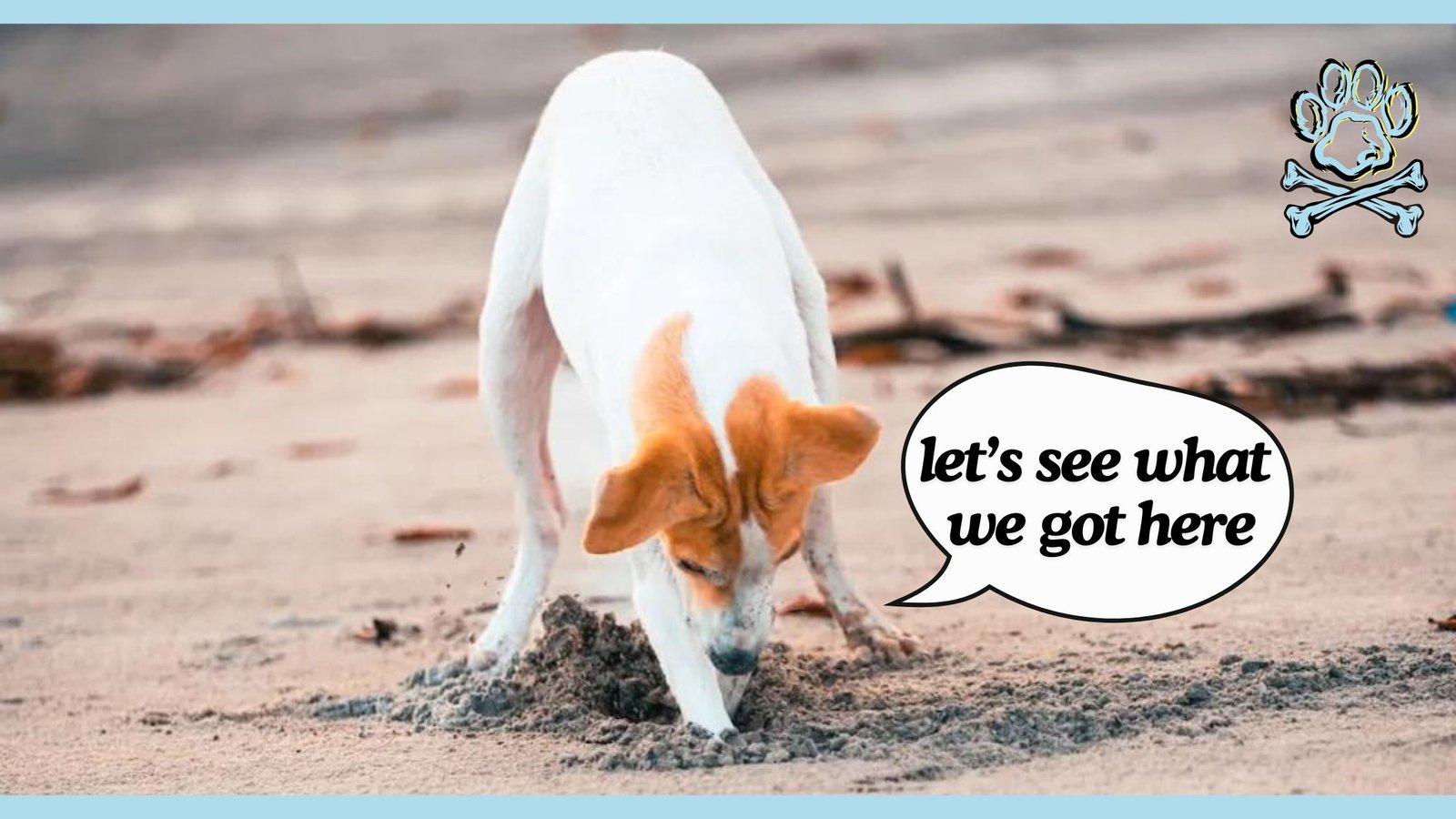
TRANSITIONING FROM INSTINCT TO PLAY: TURNING BURYING INTO A CONSTRUCTIVE ACTIVITY
While burying is a natural dog instinct, you can turn it into a fun and constructive activity for both you and your pup. Making burying into an interactive game lets you bond while satisfying your dog’s innate needs. Dogs love digging and burying toys or treats around the yard or house. So, you can make a fun treasure hunt game for them. Hide their favorite toys or treats in different spots. Then, encourage your pup to find and uncover these hidden treasures.
When your dog finds the buried items, reward them with praise and playtime. This interactive play satisfies their digging instincts. It also provides mental stimulation and strengthens your bond with the pup. Plus, it’s a great way to keep your dog engaged and entertained, reducing the chances of destructive burying behavior.
🔑 Key Points: Turn your dog’s burying behavior into a fun, interactive game. This satisfies their natural needs while providing mental stimulation. This is proven that strengthens the connection between you and your dog.
Creating a Designated Digging Area
If your dog loves to dig, create a designated digging area in your yard. Fill a sandbox or a small garden corner with loose soil or sand. Encourage your pup to bury toys and treats in this specific spot.
Incorporating Puzzle Toys and Treat Dispensers
Puzzle toys and treat dispensers are excellent for redirecting your dog’s burying instincts. These interactive toys challenge your pup to solve problems and work for rewards. They provide mental stimulation and satisfy their natural instincts to forage and hunt.
Expert Insights on Dogs’ Nutritional Needs and Burying Habits
Dogs have an instinctive drive to bury food and possessions. This behavior stems from their wild ancestors, who buried excess food to save for later. Providing a balanced diet with sufficient nutrients can help reduce this urge. Consult a vet or animal behaviorist for expert advice on managing your dog’s burying habits. They can recommend strategies tailored to your pup’s specific needs. With patience and positive reinforcement, you can redirect this natural behavior into constructive activities.
Sagi Denenberg, a vet specializing in pet behavior, says dogs’ burying things is usually not about food. Wild dogs may bury meals for later, but pet dogs are fed regularly by owners. Dr. Denenberg thinks burying protects precious items like toys or treats. This shows dogs attach meaning to objects, not just needing food. Dog trainers agree that burying reflects emotional needs. Understanding these needs can help dogs feel secure and reduce burying urges.
🔑 Key Points: Experts say dogs bury things to satisfy emotional bonds, not hunger. Allowing this meets psychological needs rather than survival instincts.
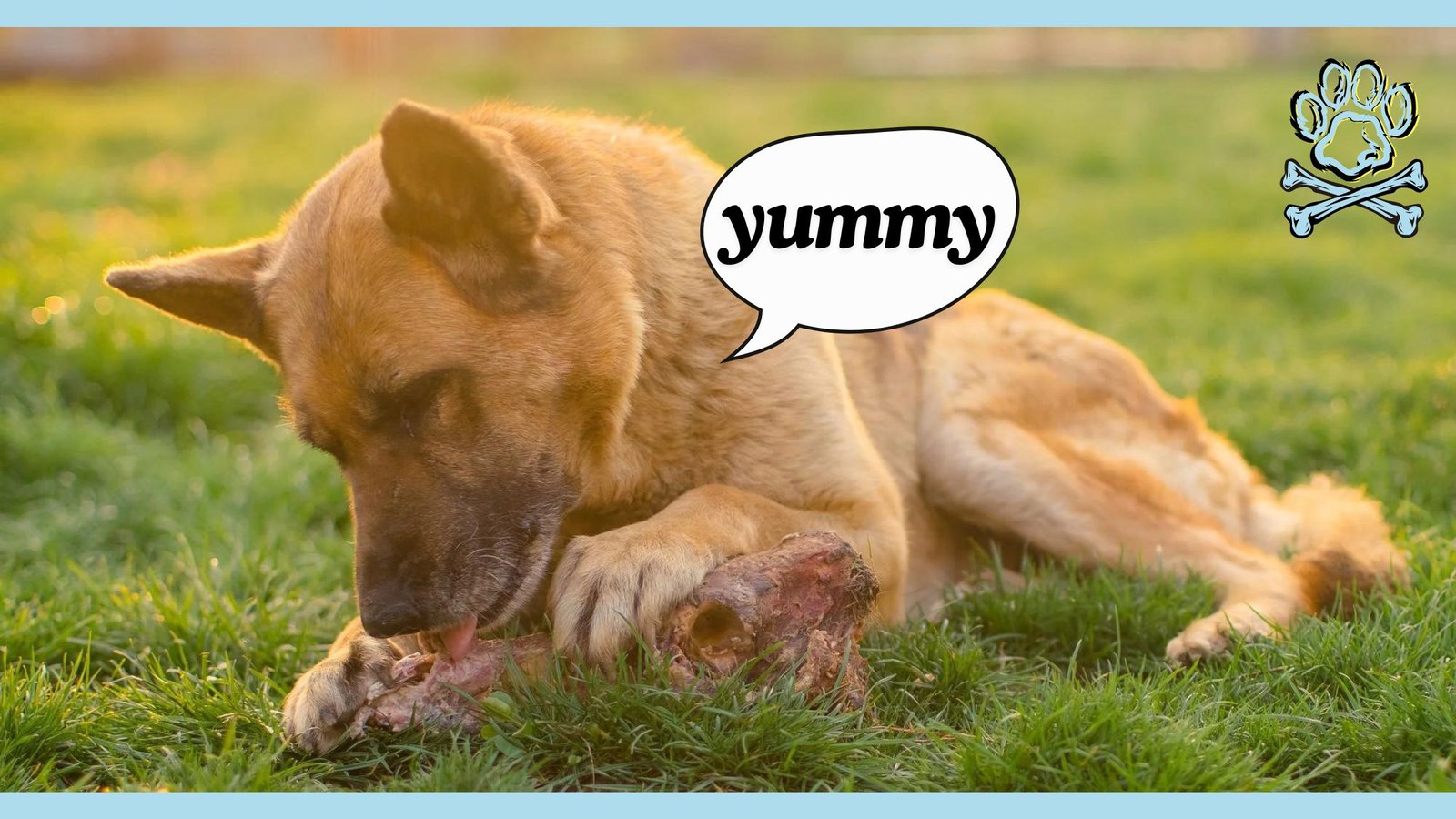
BEYOND SURVIVAL: THE MODERN DOG’S BURYING INSTINCTS
While wild dogs buried food for later, pet dogs’ burying comes from different instincts. For pets, it extends natural caching but also reflects anxiety, boredom, or guarding valuables. Domestic dogs no longer need to bury meals for survival. Their burying relates more to psychological factors like feeling anxious, bored, or attached to special toys. Understanding these modern motivations is key.
Do Dogs Bury Bones To Cope with Stress?
Dogs may bury to cope with stress or stimulate their minds when under exercised. Burying valuables lets them “save” treasured items. Seeing burying this way shows it meets emotional needs in today’s pets. Unlike hunting for buried morsels, our pampered pups bury to soothe themselves or possess prized possessions.
Owners aware of these contemporary reasons can address burying’s root causes through exercise, enrichment, and safety. Understanding why your dog buries objects is key. Most times, it’s harmless. But if it’s excessive, there may be an issue. Work with your dog’s natural instincts. Provide places for digging. Get training if needed. Your dog will feel secure.
🔑 Key Points: Your dog’s burying behavior comes from complex factors. Understand these to address it properly and support their well-being.
A Quick Summary about Why Do Dogs Bury Bones
In summary, dogs bury things due to ancient instincts. Breed, boredom, anxiety impact this behavior. We must understand these factors. As owners, create safe spaces for burying. Play interactively with your dog. Get expert help if needed. With patience and care, you can improve your dog’s well-being. Dogs love to bury things. This is a natural behavior. When dogs bury a bones or toys, they show their instincts. It’s how they store things for later.
Each buried item tells a special story about your dog. You can learn about their likes and needs from these items. Instead of stopping this behavior, you can use it in a good way. Give your dog toys they can hide and dig up again. This gives them mental and physical exercise. They’ll be happier when their natural instincts are met. Understanding why your dogs bury bones and from where they have these habits helps you bond better.
You can meet their needs and make them happy. Keep learning about your furry friend’s behaviors. Show them you care by letting them act natural. With patience and care, your bond will grow stronger. Embrace the journey of having a dog.










